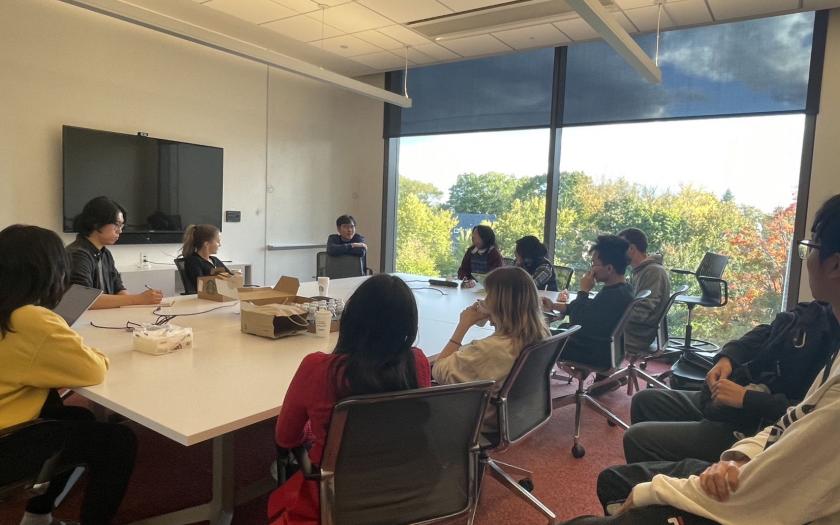BMEB Hosts Coffee Chat with Professor Lee to Support International Students

BME students gather in Brown's Engineering Resource Center with Professor Jonghwan Lee at an event hosted by BMEB's International Advocacy Committee.
When Professor Jonghwan Lee first came to the United States from South Korea as a postdoctoral researcher, he didn’t expect to stay here. He just wanted to be involved in cutting-edge research.
“I really didn’t care about anything other than research,” he said. Over a decade later, he’s now at Brown, has received $6.5 million in grant funding as a principal investigator, and is engaged in exciting research at the intersection of medical photonics, neural engineering, and artificial intelligence.
On October 9, the Biomedical Engineering Board (BMEB)’s International Advocacy Committee hosted a coffee chat with Dr. Lee where he told students about his career journey — answering questions, offering advice, and sharing anecdotes from his path to being an Assistant Professor of Biomedical Engineering and Brain Science at Brown.
The Committee’s Chair, Zhaowei "Zoey" Jiang, and the Committee wanted “to learn more about the challenges that international faculties have faced and overcome” while allowing students to ask questions directly to international faculty members. Dr. Lee was immediately “very enthusiastic and supportive,” Xingjian "Gavin" Lu, one of the Committee members said.
The coffee chat was casual, with students and Dr. Lee huddled together around a conference table in the Engineering Resource Center, sharing coffee and small snacks. Gavin hoped that “the casual setting would further encourage students to ask more questions and join the conversation.”
Dr. Lee completed his undergraduate degree in Physics and his Ph.D. in Neural Engineering at Seoul National University in South Korea. Before completing his Ph.D., Dr. Lee gained experience working in the industry through his mandatory military service in South Korea. He worked for a company for four years and said their work was exciting but he didn’t feel personally fulfilled. He realized that “academia is a better fit for me.”
Dr. Lee said that coming to the United States for a postdoctoral job is “a very routine pathway (for Korean Ph.D. students), if you really want to get a tenure track position in Korea or U.S.” The 2008 recession threw a wrench into Dr. Lee’s plans and funding to work at an American institution proved hard to secure.
Eventually, Dr. Lee was able to start his postdoctoral work in an interdisciplinary research center affiliated to Harvard Medical School and the Massachusetts Institute of Technology. Early on, he received a highly competitive K99 grant, which supported his work. His first K99 proposal was rejected—a challenge Dr. Lee noted was initially hard to process.
Initially, he felt defensive toward the reviewers, thinking “they don’t understand my vision.” Then, he concluded that it was because his writing didn’t effectively convey his ideas. After further reflection, Dr. Lee realized that knowing the current landscape and “how we have to shape our science accordingly” in grant applications to demonstrate how your work will further the boundaries of technology and knowledge is key to securing funding.
But he also emphasized “good academic writing is still important.” When he was a Ph.D. student, Dr. Lee participated in a workshop that helped Korean native students learn to write academic English. He said he “needed real-world training” to truly understand what differentiates scientific writing. “If you write more, you will become better,” he told students.
Yuwei Liu, a BME Master’s student who attended the event, said it helped her understand that “getting (a) grant is a huge part of being a professor.” While Yuwei is leaning toward entering the industry, she said she “wanted to hear about (Dr. Lee’s) journey as an international scholar here.”
Dr. Lee recently received tenure, which he said opens up multiple paths for faculty. He said some faculty members focus more on mentoring next-generation scientists, while others may further delve into research or pursue positions in service to the University. He wants to pursue more research now that he’s tenured.
Research post-tenure is often less hands-on, Dr. Lee said, and means he’ll spend more time planning and ideating projects. Since his postdoc, Dr. Lee has worked to initiate more collaborations with other researchers. Collaboration is “very important in BME because BME is very interdisciplinary,” he said.
At Brown, Dr. Lee connects with hospitals, neurologists, and ophthalmologists. He told students that it can often be difficult to initiate collaborations, but that making the effort to work across disciplines is worth it. “Clinicians and engineers have very different strengths. When they work together, I think it is very good,” he said.